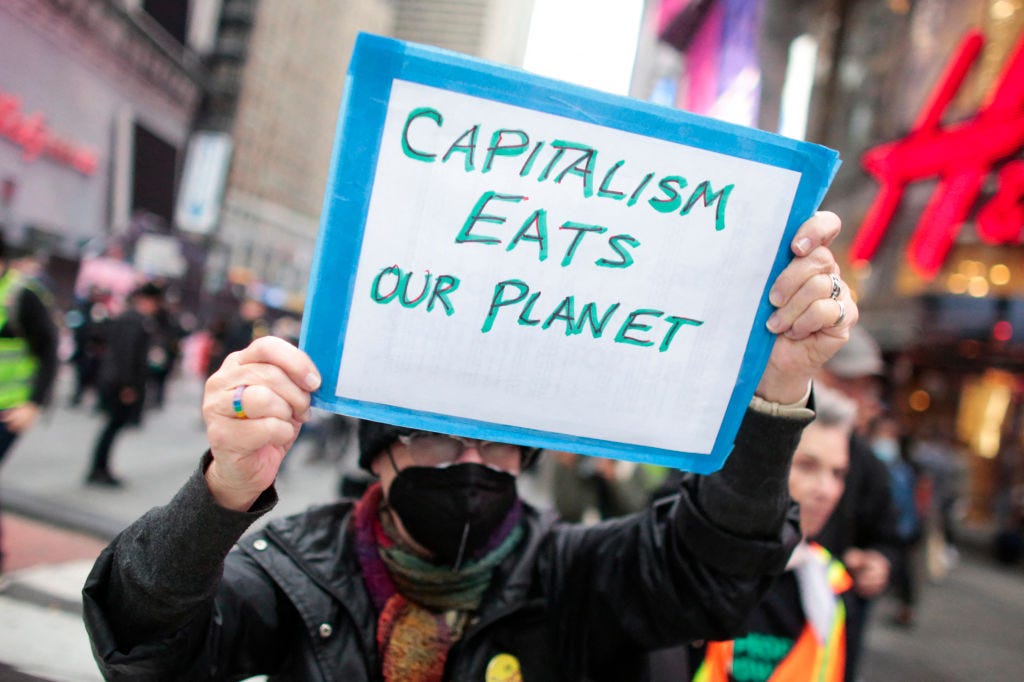Rewriting the fairy tale of capitalism
Authors and activists George Monbiot and Peter Hutchison want to tell a better story for humanity’s future
Neoliberalism is so much a part of our economic and political existence, British author and activist George Monbiot and American filmmaker and writer Peter Hutchison suggest, that it’s hard even to see it, let alone talk about it, or plan for what might come next.
That’s been an obstacle for those who’ve been trying to formulate — and communicate — a better solution. And that’s the challenge Monbiot and Hutchison take on in their latest book, The Invisible Doctrine: The Secret History of Neoliberalism.
In the mode of the solutions proposed by the economist Joseph Stiglitz and the economist and philosopher Daniel Chandler, Monbiot and Hutchison aim to replace what they call the “fairy tale” of capitalism — the fantasy of success for all which has subordinated democracy to finance — with a better story, one that puts humanity at its center, rather than growth or efficiency. And for them, that means trying something radically new — which is what any significant advance has always required.
Our timidity is both fatal and irrational. Incremental change leads nowhere. Society is a complex system with two equilibrium states, that it flips between. One is called Impossible. The other is called Inevitable. Before systemic change happens, it is always impossible. Votes for women? They would never let that happen. Decolonization? You have got to be joking. Civil rights? Don’t make me laugh. Marriage equality, legal abortion, sexual liberation, the weekend … all preposterous proposals! Then they happen, and everyone thinks “Well that was inevitable, wasn’t it?”
We talked to Monbiot about the beginnings of capitalism, how we got to the present polycrisis, why progressives have asked for little (and why they should be asking for a lot more), and what a future “politics of belonging” might look like.
A request for those who haven’t yet joined us: The interviews and essays that we share here take research and editing and much more. We work hard, and we are eager to bring on more writers, more voices. But we need your help to keep this going. Join us today as a paid subscriber to support the kind of independent media you want to exist.
Can you walk us through what you mean by “neoliberalism” — the “invisible doctrine” of your new book’s title? And how do you define “capitalism,” for that matter?
Let’s start with capitalism. It’s often portrayed as if it were some kind of natural law, a basic property of human relations. It is nothing of the kind. Capitalism is a very particular form of economic organization, which, following the work of the geographer Jason Moore, we date to the island of Madeira in roughly 1450. This was arguably the first time and place in which land, labor, and money were simultaneously commodified. The success of the Portuguese colonists, the first capitalists, set in train a particular mode of extreme and rapid exploitation, which led simultaneously to the explosion of colonial seizure and to the cascading collapse of ecosystems. We define capitalism as follows:
Capitalism is an economic system founded on colonial looting. It operates on a constantly shifting and self-consuming frontier, on which both state and powerful private interests use their laws, backed by the threat of violence, to turn shared resources into exclusive property, and to transform natural wealth, labour and money into commodities that can be accumulated.
Capitalism expanded with few constraints in its early centuries. Its advocates demanded that governments laissez-nous faire: leave us alone. But then it ran into a problem, a problem it has sought to solve ever since: democracy. When most adults got the vote, they sought to use it to improve wages and labor conditions, demand a greater share of productivity gains, and make other outrageous requests, such as not poisoning the air and rivers, adulterating food or charging extortionate rents. They even went so far as to demand the redistribution of wealth, effective public services and an economic safety net. Neoliberalism was hatched as a means of solving the problem of democracy.
By contrast to laissez-faire economics, neoliberalism demands active government: to tear up the democratic social contract, privatize public assets and public services, dissolve the welfare state, curtail trade unions and protests, and exploit or create crises to impose unpopular policies. It provides an infrastructure of justification to make this shift seem as if it is the only rational destiny for society.
Neoliberalism is a doctrine that insists we should resolve our problems not through politics but through a mechanism it calls “the market”: one of its many deliberately confusing terms. In this case “the market” means the power of money and those who possess it. Neoliberalism proposes that competition is the defining feature of humankind and that by buying and selling in a competitive “market”, we can discover a natural hierarchy of winners and losers. It insists that anything disrupting this hierarchy - tax, redistribution, trade unions, politics itself - impedes human flourishing and paves the road to totalitarianism. It is a series of convenient fictions designed to justify inequality, leading in time to oligarchy.
We’ve talked to several people lately who’ve suggested we are at the end of the neoliberal era, that neoliberalism has obviously failed, and they’ve focused, as you do, on the 2008 financial crisis as the clearest example. What do you think about neoliberalism’s prospects?





